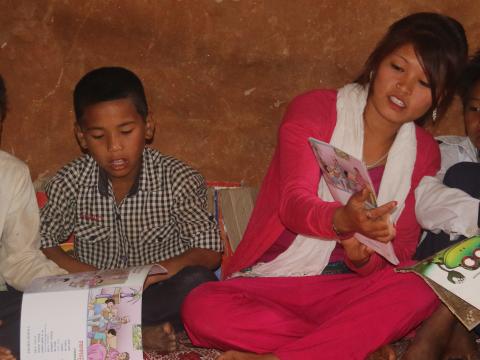Learning with fun beyond school hours

It's Saturday, an official government holiday, and all schools are closed in Sindhuli district but in the remote village of Tinkanya some children are dressed in school uniform and enthusiastically heading somewhere.
Where could it be?
Giggling and laughing they reach a community building located on a scenic hill. For miles and miles there is nothing around but lush green hills and clear blue sky with occasional white clouds. This picturesque view readily captures any passerby's attention.
But why are the children here?
The answer is quite simple. They are here to study at a reading camp.
Bimala Ale Magar, the Reading Camp Facilitator, welcomes all the children inside the camp with a smile. The walls of the mud mortar building are beautifully decorated with colourful drawings of butterflies, birds, and flowers. The drawings have been made by the children themselves during the reading camp. Red, white, and yellow chart papers have been pasted on the walls. Some chart papers have the Nepali alphabets drawn on them, some have the lyrics of children's songs. On the far right dozens of story books have been hung on a string. Some curious children can't stop gazing around. All the children seem to really enjoy the well-decorated setting.
Once all the children have settled down Bimala explains the day’s agenda, which has also been pasted on the wall. The children listen excitedly as she says, "Today we will be singing, dancing, playing games, reading story books, and learning new words."
Among the small group of children at the camp is 6-year-old Urmila, a student of grade one. She giggles as she shows her friend a cartoon she drew on the cover page of her note copy.
Apart from drawing she also likes reading story books. She says, "I enjoy coming to the reading camp because I get to read interesting story books which are not available at school. I also get to borrow the books to study at home. Here, learning is fun and children have better access to reading materials."
Her favourite story book at the reading camp is Harke Hatti, which is about an elephant called Harke. The story is about how Harke searches for a friend to play with and ultimately finds another elephant friend. Urmila can't get enough of the story and she enjoys going through it again and again. She says, "This book has a colour picture on every page which makes reading it more interesting."
In an effort to boost the reading skills of early graders (grades one to three) World Vision has established reading camps in Sindhuli district under the Education Recovery Project. The reading camps run on Saturdays starting at 7 a.m. and one session lasts 90 minutes.
"Reading camp is an innovative approach to teach early graders through song, dance, art, games, and the use of various visual materials. This excites the young minds and captures their interest. I am happy that World Vision is implementing this model which is not available in school curriculum," Bimala says. "It is really encouraging that so far there has been active participation from the local children."
Jeet Bahadur, a student of grade two, (left), says, "Reading camp is my favourite place. I can play and study here with my friends."
To date 48 reading camps have been established and equipped by World Vision in Sindhuli district and around 1,000 children are directly benefitting from them. Each reading camp is equipped with lockable metal box, white board, cushion, tarpaulin, story books, and stationary materials.
Rajkumar Dulal, Project Manager for World Vision in Sindhuli, says, "The active engagement of parents in the reading camps has also helped to reduce the level of disconnect between parents and schools. Staff from World Vision and implementing partner Sindhuli Integrated Development Services (SIDS) Nepal have been informing the parents about the value of education and parents' role in supporting their children at home to improve their literacy."
It seems the reading camps in Sindhuli have provided children with a space where they can experience the true joy of learning.
Learn more about this Recovery Education Project supported by World Vision USA through this video
